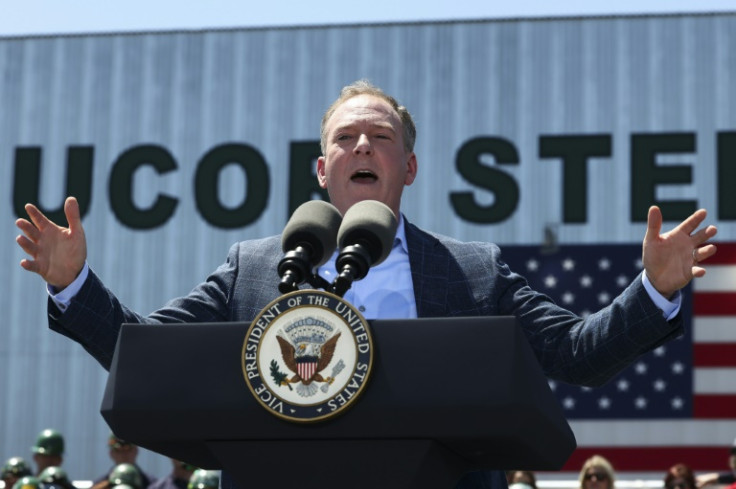US Pushes To Revoke Scientific Ruling That Underpins Climate Regulations

President Donald Trump's administration on Tuesday moved to reverse a foundational scientific determination that underpins the US government's authority to limit greenhouse gas emissions from motor vehicles and, more broadly, to combat climate change.
Speaking at an auto dealership in Indianapolis, Environmental Protection Agency Administrator Lee Zeldin argued that the 2009 Endangerment Finding was based on flawed reasoning and had inflicted serious economic harm.
"If finalized, today's announcement would amount to the largest deregulatory action in the history of the United States," he said, standing alongside Energy Secretary Chris Wright, who added his department had carried out a new study about climate science.
The proposed move -- first announced in March -- will be subject to a 45-day public comment period and is certain to face legal challenges.
While Zeldin cast the move as a way to reverse what he called the "Biden-Harris administration's electric vehicle (EV) mandate," revoking the Endangerment Finding could also unravel the legal basis for a wide array of climate regulations, including those on power plants and oil and gas operations.
In his remarks, Zeldin accused the EPA under former president Barack Obama, a Democrat, of making "mental leaps" in determining that heat-trapping gases posed a threat to public health and welfare.
The EPA said in a press release that the finding had "been used to justify over $1 trillion in regulations" and undoing it would save $54 billion annually.
The Endangerment Finding was grounded in overwhelming scientific consensus and peer-reviewed research. It followed a landmark 2007 Supreme Court ruling that found greenhouse gases qualify as air pollutants under the Clean Air Act and directed the EPA to revisit its position.
Transportation accounts for 28 percent of US greenhouse gas emissions -- more than any other sector.
According to a recent analysis by the nonprofit Natural Resources Defense Council, if it were a country, the US transportation sector would rank as the fourth largest emitter of greenhouse gases globally, while the power sector would be fifth.
Environmental groups and states are expected to swiftly sue. The case could ultimately reach the Supreme Court, which may need to overturn its own 2007 precedent to side with the current Republican administration.
Dan Becker of the Center for Biological Diversity told AFP the Endangerment Finding has survived multiple legal challenges by industry over the years. "But this time, it's the government itself mounting the attack," he said.
"Hopefully they will recognize that this is science and not politics -- that there was a good reason for that precedent and no good reason to revoke it," said Becker. "But this is a very political court."
He added that the administration's cost-saving arguments were misleading, pointing to official data showing that rules now targeted for repeal saved the average American driver $6,000 in fuel and maintenance over the lifetime of vehicles built under the standards.
"It's abundantly clear what's going on here," said Gretchen Goldman, president of the Union of Concerned Scientists. "The Trump administration refuses to acknowledge robust climate science and is using the kitchen sink approach: making every specious argument it can to avoid complying with the law."
Since returning to office, Trump has withdrawn the US from the Paris Agreement and launched a sweeping campaign to expand fossil fuel development -- including new moves this week to open ecologically sensitive areas of Alaska to drilling.
The announcement comes as the planet swelters under record heat. Tens of millions of Americans are baking under a brutal heat dome in the Southeast, while climate-fueled flooding earlier this month killed more than 100 people in Texas.
© Copyright AFP 2024. All rights reserved.





















